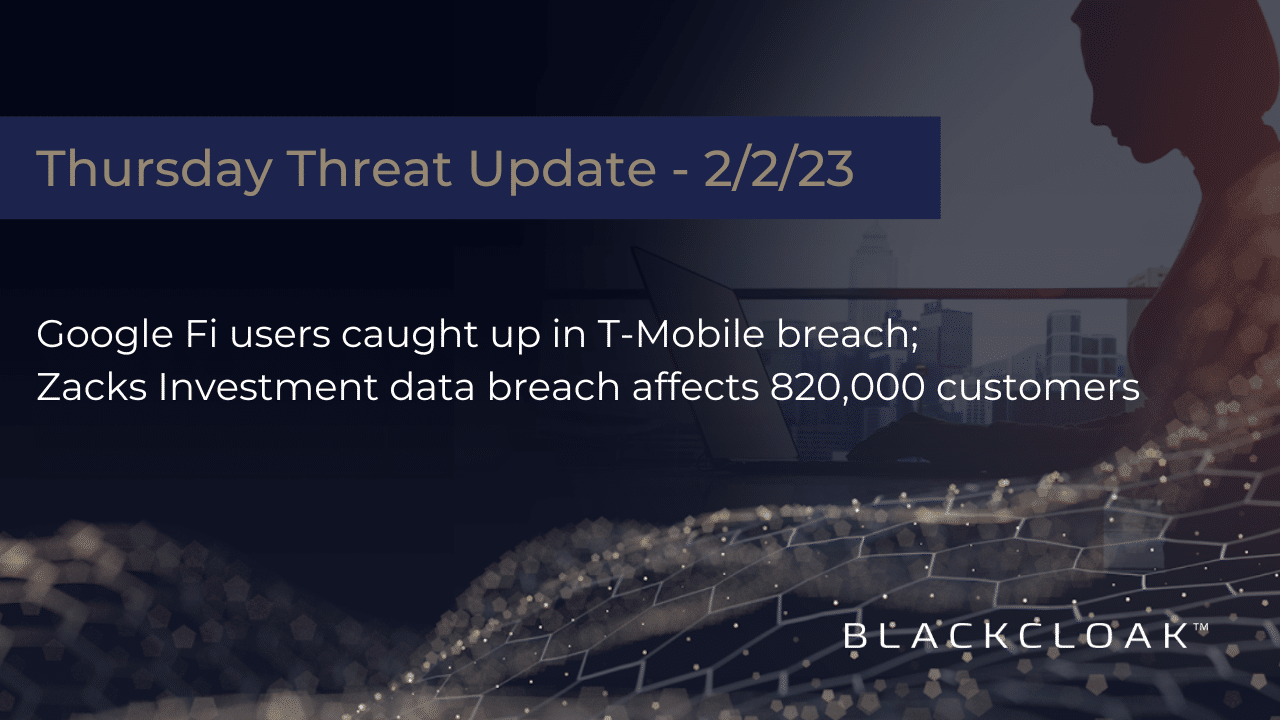Google Fi users caught up in T-Mobile breach; Zacks Investment data breach affects 820,000 customers

If it feels as though more and more people are becoming data breach victims, there’s evidence to prove it isn’t just a feeling.
In the Identity Theft Resource Center’s Annual Data Breach Report, the number of data breach victims rose to 422.1 million people in 2022, a 41.5% rise from 2021. The number is even more staggering when you consider there was a slight decrease in reported data breaches last year.
It’s unlikely this figure will be going down any time soon, which is why it’s important to stay on top of the latest data breach stories and take action as soon as possible should you become a victim yourself.In this installment of the BlackCloak Thursday Threat Update, we will look at data breaches affecting Google Fi users and Zacks Investment Research customers.
Google Fi users caught up in T-Mobile data breach
What we know: Google has started to inform its Google Fi users that their data was stolen during the T-Mobile data breach that took place at the beginning of the year. In its email to affected individuals, Google said personal information, payment card data, Social Security numbers and other sensitive data was not exposed in the breach. However, phone numbers and SIM card serial numbers were compromised in the incident.
Recommendations: Even if you do not receive a data breach notification from Google, anyone who is a Google Fi user should strongly consider swapping their SIM card as soon as possible. Cybercriminals may attempt to reroute phone calls and text messages to devices they control through a tactic known as SIM hijacking. Since phone numbers were also exposed in the breach, Google Fi users should also be on the lookout for spam text messages cybercriminals send through a different tactic known as “smishing.”
Zacks Investment Research breach affects 820,000 customers
What we know: Zacks Investment Research discovered the customer records of 820,000 customers had been accessed sometime between November 2021 and August 2022. Zacks said exposed data points included names, addresses, phone numbers, email addresses and users passwords. Zacks added that no financial data had been compromised during the incident.
What we know: Zacks customers should be on the lookout for phishing emails and “smishing” text messages. If you receive any message that conveys a sense of urgency and tries to get you to turn over personal data, money or login credentials, do not engage with it. No legitimate organization will ever ask you for any additional information to conduct a service. Additionally, reset your Zacks password as soon as possible, and ensure you create a password that is unique and follows the best password practices.
Stay on top of every threat
Cyberattacks come in many different forms, and it is a good idea to learn how each one works to best protect yourself from becoming a victim of a data breach, identity theft or even having your money stolen.
Learn how cybercriminals use SIM hijacking to compromise cryptocurrency accounts, and why spam emails are a threat you should take seriously.








